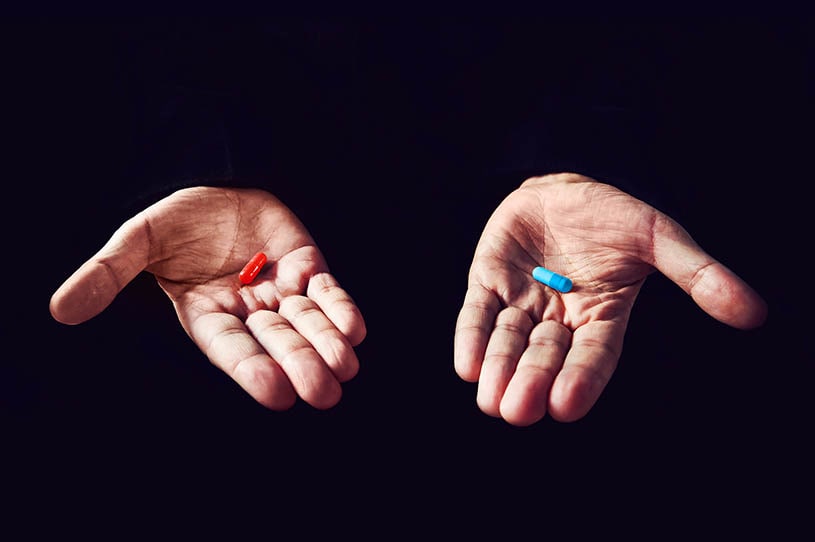Naltrexone, under the brand name Vivitrol, is under the drug class opioid antagonist. The primary use of this medication is to make patients recovering from drug and alcohol abuse become drug-free and alcohol-free. In 2018, around 300,000 patients in the United States used this medication. However, there are circumstances when patients tend to look for alternatives due to some reasons such as allergic reactions or incompatibility with pre-existing health diseases.
Table Of Contents:
Moreover, there are several Vivitrol alternatives that are used to treat alcohol dependence and opioid addiction. Just like this drug, most of these alternatives are also not sold over-the-counter. Nevertheless, the prescription of any of these Vivitrol alternatives depends on factors like patient motivation, treatment goals, and medical comorbidities. In this article, information about the different Vivitrol alternatives will be provided.
Naltrexone Alternatives
Vivitrol alternative drugs can be prescribed because of reasons like treatment goals, discomforting side effects, effects on reproductive health, and medication tolerability to the drug. Moreover, Current Psychiatry Reports stated that there is a lack of Vivitrol alternatives but certain drug classes such as sulfonic acid drugs, opioid partial agonists, and disulfide drugs are possible to become one as long as the patient is adherent and compliant. Although it is possible to switch from one drug to another, it is important to understand that switching medications should always be under the recommendation of a medical doctor for safer and more effective recovery results.
Naloxone vs Naltrexone
When comparing Naloxone vs Naltrexone, both of these drugs are under the drug class opioid antagonists. This means that both Vivitrol and Naloxone’s use is to block the effects of opioid drugs and opiates. They work by binding to opioid receptors in the brain and prevent other opioid substances from exerting any influence on a person.
For Naltrexone vs Naloxone uses, the primary use of the former is for the treatment of alcohol and drug dependence. It prevents a person from experiencing any pleasure after ingesting an opioid drug, helping break the physical dependence on it. On the other hand, Naloxone is used for reversing opioid overdose. Narcan, a brand name for Naloxone, can prevent respiratory depression due to an overdose.
| DRUG GENERIC NAME | NALTREXONE | NALOXONE |
| BRAND NAME | Vivitrol | Narcan |
| DRUG CLASS | Opioid antagonists | Opioid antagonists |
| AVAILABILITY OF GENERIC VERSIONS | Yes | Yes |
| APPROVED AGE OF USE | 18 years old and above | All ages |
| TREATMENT LENGTH | 12 weeks or more, depending on the recommendation of a medical doctor | Treatment length depends on the overdose condition of the patient |
| PRESCRIPTION FORMS | Prescription-only | Prescription-only |
| RISK OF WITHDRAWAL OR OVERDOSE | Only when taken with other CNS depressants such as alcohol | Only when taken with other CNS depressants such as alcohol |
Comparing Naloxone vs Naltrexone duration of action, Vivitrol has a significantly longer action versus Narcan, which makes it suitable for long-term addiction treatment. At the same time, Vivitrol takes longer to act, which makes it unsuitable as first-line therapy for opioid overdose. It eliminates the pleasurable effects of opioid drugs, reducing cravings over time. Narcan begins exerting an opioid-blocking influence within five minutes after the administration and can save a person’s life during an overdose. This rapid metabolism comes at a price: the medication becomes ineffective after approximately an hour after the delivery.
Naloxone vs Naltrexone: The Differences
Many people wonder what the difference between Naloxone and Naltrexone is since the drugs work in essentially the same way. The main difference between Naltrexone vs Naloxone is the half-life of each medication. The most significant difference between Naloxone vs Naltrexone is how long Vivitrol stays in one’s system. A Vivitrol injection lasts for a month, allowing for a slower release of the drug. It is designed to be durable to provide a longer action that requires less effort from a patient. Vivitrol is used in long-term rehabilitation to prevent a relapse, and it can’t be used when opioids are still present in the person’s body.
Narcan is intended to start acting in 2 minutes after the administration. It is used to urgently block the effects of a substance when an opioid overdose is suspected. The drug can save a person’s life by instantly reversing CNS and respiratory depression. Narcan acts more rapidly versus Vivitrol, but it also doesn’t last long and wears off in 30 minutes to an hour after the delivery.
Another difference between Naloxone and Naltrexone is the purpose of each drug. Naloxone is used as an emergency medicine during an opioid overdose, while Vivitrol is applied as a part of long-term addiction treatment. Narcan alone cannot be used as an alternative to Vivitrol. However, together with buprenorphine, it is present in the drug called Suboxone and can be effective in withdrawal treatment. Contact a medical health professional or a doctor to get more information about Naltrexone vs Naloxone.

Acamprosate vs Naltrexone
In Acamprosate vs Naltrexone, the former is under the drug class sulfonic acids while the latter is under the drug class opioid antagonists. Although Acamprosate vs Naltrexone differ in their drug classes, they have the same indication: maintenance of alcohol abstinence in patients under alcohol abuse recovery. Moreover, the Society for the Study of Addiction states that Narcan is more effective in promoting abstinence while Vivitrol is more effective in reducing heavy alcohol drinking and craving.
When it comes to Acamprosate vs Naltrexone side effects, these two drugs have some common and different side effects. In Naloxone, patients may experience decreased potency or delayed ejaculation while in Vivitrol, patients may experience weight loss, too much sweating and tingling of extremities. Moreover, the side effects they both have include the following:
- Diarrhea and constipation
- Abdominal pain and cramps
- Sleep problems
- Anxiety
- Nausea and vomiting
- Tiredness or weakness
- Dizziness
- Headache
- Skin rashes
- Joint and muscle pain
Some of the side effects above may be discomforting and may become serious. In case there are suspected or observed side effects at home or in a medical institution, contact emergency care to avoid unwanted dangers to the health.
Suboxone vs Naltrexone
In Suboxone vs Naltrexone, the latter, also called Buprenorphine/Naloxone, is a Vivitrol alternative that is similarly used to treat opioid addiction and dependence. It is under the drug class opioid partial agonist and its main dosage forms are pills, dissolving tablets, and sublingual film, unlike Vivitrol which is available in injectable and oral formulations.
Although both of these medications are used to reduce opioid cravings, they work differently from one another. In Suboxone vs Naltrexone, the former blocks opiates, and since it contains Buprenorphine, it helps in detoxifying patients who are addicted to heroin and other opioids. However, there is some danger in using Suboxone and that is the possibility of withdrawal and addiction, unlike that of Vivitrol which is a sole opiate blocker with no addictive and withdrawal properties.
Naltrexone vs Suboxone Side Effects
Moreover, in Naltrexone vs Suboxone, both of these drugs are prescription medications. There are also similar and different side effects between these two. Patients using Suboxone may experience side effects such as a cough or changes in voice, pain when urinating, jaundice, nasal discharge, and sneezing. On the other hand, patients using Vivitrol may experience side effects such as loss of appetite, anxiety, and irritability. Moving on, below are the side effects that Naltrexone vs Suboxone have:
- Dizziness
- Headache
- Chills
- Skin rashes
- Nausea and vomiting
- Stomach pain
- Sleep problems
- Weakness and tiredness
- Sweating
- Joint and muscle pains
If there are any discomforting side effects being experienced at home, contact emergency care as soon as possible and get immediate help to avoid unwanted dangers to the health, especially when the side effects are related to Suboxone alone.

Always Consult Before Switching To Alternatives
When patients get a prescription from a doctor, it can be said that the medication prescribed is intended to cure or mitigate the current health condition of the patient. However, there are certain cases when the prescribed drug needs to be changed such as when the patient is experiencing unwanted side effects or when the drug is not working effectively. A doctor may prescribe alternative medications depending on the treatment goal and response of the patient. Moreover, Vivitrol alternatives may provide dangerous withdrawal and addiction effects. For this reason, any drug abuse signs should be treated as soon as possible. Contact the medical staff in the addiction centers with their treatment programs to get the best help options for those with opioid addiction. Patients with alcohol and drug abuse problems who do not want to use medications at home may also contact these addiction centers. These patients, then, may enroll themselves in drug rehabilitation centers. Special addiction treatment programs for addicts help for a personalized approach to a patient’s needs and support more coherent treatment courses. Patients will start the treatment with detox, followed by a series of therapy sessions (CBT, DBT, Motivational Enhancement, etc.).
Hope Without Commitment
Find the best treatment options. Call our free and confidential helpline
Most private insurances accepted
Page Sources
- Boyer, E. W. (2012). Management of opioid analgesic overdose. New England Journal of Medicine, 367(2), 146-155.
- Galanter, M., Kleber, H. D., & Brady, K. T. (Eds.). (2015). The American Psychiatric Publishing textbook of substance abuse treatment. American Psychiatric Pub.
- Harvard Health. (2016, April 1). A monthly shot for opioid addiction: An option for some. https://www.health.harvard.edu/blog/a-monthly-shot-for-opioid-addiction-an-option-for-some-201604019364
- Kane, S. P. P. (2018). Naltrexone - Drug Usage Statistics, ClinCalc DrugStats Database. ClinCalc. https://clincalc.com/DrugStats/Drugs/Naltrexone
- Krupitsky, E., Zvartau, E., & Woody, G. (2010). Use of naltrexone to treat opioid addiction in a country in which methadone and buprenorphine are not available. Current psychiatry reports, 12(5), 448-453.
- Maisel, N. C., Blodgett, J. C., Wilbourne, P. L., Humphreys, K., & Finney, J. W. (2013). Meta‐analysis of naltrexone and acamprosate for treating alcohol use disorders: when are these medications most helpful?. Addiction, 108(2), 275-293.
- Malm, H., & Borisch, C. (2015). Analgesics, non-steroidal anti-inflammatory drugs (NSAIDs), muscle relaxants, and antigout medications. In Drugs During Pregnancy and Lactation (pp. 27-58). Academic Press.
- Rubio, G., Jimenez-Arriero, M. A., Ponce, G., & Palomo, T. (2001). Naltrexone versus acamprosate: one year follow-up of alcohol dependence treatment. Alcohol and Alcoholism, 36(5), 419-425.

 Authored by
Authored by  Reviewed by
Reviewed by 

